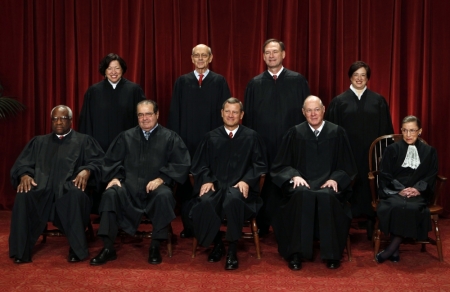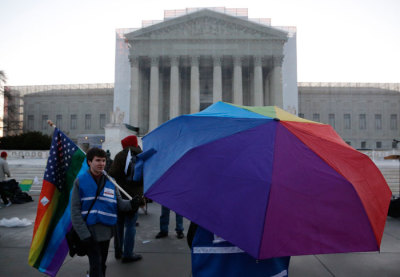Will Children of Gay Parents Sway the Supreme Court on Gay Marriage?

Justice Anthony Kennedy, the likely swing vote in the U.S. Supreme Court's upcoming gay marriage decision, appeared to place a high value in how the Court will affect the children of gay parents. Some of those children are now telling Kennedy and the Court that redefining marriage to include same-sex couples is harmful for children.
During oral arguments for the 2013 gay marriage case Hollingsworth vs. Perry, Kennedy asked, "there is an immediate ... what could be a legal injury, and that's the voice of these children [of same-sex parents]. There are some 40,000 children in California ... that live with same-sex parents, and they want their parents to have full recognition and full status. The voice of those children is important in this case, don't you think?"

While Kennedy presumed to know what all 40,000 of those children wanted, some children of same-sex couples now want Kennedy to know that they do not support gay marriage.
Redefining marriage to include same-sex couples "would actually serve to strip [children of same-sex parents] of their most fundamental rights," Katy Faust, who was raised by same-sex parents, wrote in an open letter to Kennedy published at The Public Discourse.
Faust, who serves on the Academic and Testimonial Councils of the International Children's Rights Institute and writes at asktheBigot.com, said that most of the media believe it impossible for someone like her — someone who both loves her gay parents and opposes gay marriage — to even exist.
Faust is one of at least six adult children of same-sex parents who will also submit amicus briefs to the Supreme Court for this June's gay marriage case.
At its core, Faust argued, the government's interest in marriage should be about the children, not the feelings of the parents.
"There is no difference between the value and worth of heterosexual and homosexual persons," she wrote. "We all deserve equal protection and opportunity in academe, housing, employment, and medical care, because we are all humans created in the image of God.
"However, when it comes to procreation and child-rearing, same-sex couples and opposite-sex couples are wholly unequal and should be treated differently for the sake of the children."
Every child raised by a same-sex couple is denied the opportunity to be raised by either a father or a mother in the home, she pointed out.
"When a child is placed in a same-sex-headed household, she will miss out on at least one critical parental relationship and a vital dual-gender influence. The nature of the adults' union guarantees this. Whether by adoption, divorce, or third-party reproduction, the adults in this scenario satisfy their heart's desires, while the child bears the most significant cost: missing out on one or more of her biological parents."
Another adult child raised by gay parents, Robert Oscar Lopez, says that his upbringing led him to be "sexually confused" as a child.
In an amicus brief for a gay marriage case in the U.S. Court of Appeals for the 11th Circuit, Lopez wrote about his desires as a child to have sex with men his father's age. He became a "habitual sex worker" by the time he was 16.
"I needed to feel loved and wanted by an older male figure, even if for only as short as a half hour," he wrote.
It was not until he rebuilt his relationship with his father that Lopez was able to overcome those desires.
Due to his personal experience, Lopez continued, he objects "strenuously to marriage and adoption for gay couples." (He does support same-sex civil unions and some kinds of foster care for same-sex couples.)
"Both marriage and adoption," he continued, "involve using the force of the state to force unwilling children into emotional relationships with people who are not their parents and this coercion is permanent, hurtful, and discriminatory, insofar as all children have a mother and father but children placed in same-sex-couple homes are stripped of one of these two figures without their consent."
His opposition to gay marriage, Lopez added, is consistent with the goals of the gay marriage movement — "to honor relationships, to respect how people are born (i.e., "born" gay), and to refrain from telling people whom they should love" — because: "We must honor the universal relationship between children and their father and mother. We must respect the fact that children are 'born that way' with a mother and father, always. Lastly, we must not tell children that they have to love adults who are not their parents simply because these gay adults say they love them and want to have custodial powers over them."





















